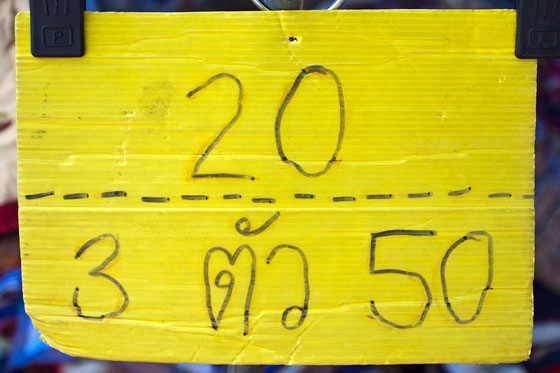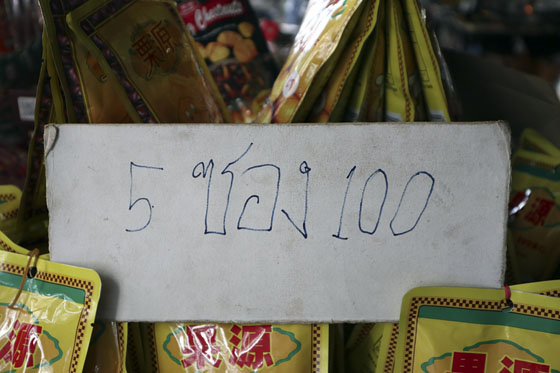Learn How To Read Thai - Tutorial 13
Classifiers
Very soon after you start learning Thai you will encounter classifiers, but don't worry. English uses classifiers for uncountable nouns. When you go to the bakers you don't ask for a bread, you ask for a loaf of bread. Loaf, along with slice and maybe some others, is a classifier for bread.
The difference in Thai is that all nouns have a classifier, even countable nouns. The problem is that there are many classifiers and the classifier for each noun needs to be remembered. As I said, don't worry. You will soon pick up the common classifiers and there is a 'Get out of jail free card' for those classifiers you don't know or can't remember. I'll tell you what it is further down the page.
In terms of grammar, Thai is much simpler than many other languages. With many languages you must remember if nouns are masculine, feminine or neutral and adjust your grammar according. An appropriate grammar article must be used and with a language such as German there are three definite articles.
Thai has no grammar articles and most sentences have a very simple structure, however, the use of classifiers adds a level of difficulty.
How Are Classifiers Used?
In English you might ask, "How many cats?" Thai is quite different because there are no plural nouns and because of the use of classifiers.
First, let's look at some classifiers, and the classifier for animals is 'dtua'.
ตัว - 'dtua'
The classifier 'dtua' isn't used only for animals, it is used for other things, such as some items of clothing, fans, tables, chairs, etc. In addition, 'dtua' is not used for every animal. Elephants have a special status among animals in Thailand and the classifier for elephants is 'cheu-uk'.
เชือก - 'cheu-uk' (classifier for elephants, also the Thai word for 'string' or 'rope')
With some nouns you can use different classifiers. For example, the classifier for eggs can be 'bai' or 'fong'.
ใบ - 'bai'
ฟอง - 'fong'
There is a classifier for fruit and a classifier for round things, therefore, if you have a round fruit you can use different classifiers and still be correct.
Getting back to my original question, "How many cats?" the Thai word for, "How many?" is 'gee'.
กี่ - 'gee'
And the Thai word for cat is 'maew'.
แมว - 'maew'
The question in Thai is, 'maew gee dtua?'
แมวกี่ตัว - 'maew gee dtua' (How many cats?)
สุนัขกี่ตัว - 'suu-nuk gee dtua' (How many dogs?)
ช้างกี่เชือก - 'chaang gee cheu-uk' (How many elephants?)
If you think it isn't necessary to learn Thai because these days you can use Google translate, think again. Computer-based translation is still terrible, including Google's version. Google translate tells me 'gee maew', which is wrong.
Asking 'how many' questions is therefore 'noun - gee - classifier'. It's 'gee' as in the Indian 'ghee' and not 'jee' as in 'golly gee'. The inconsistencies in the pronunciation of English vowels and consonants is one reason why transliteration is such a disaster (there are many others).
To answer, you reply with 'quantity - classifier' or 'noun - quantity - classifier'
แมวสามตัว - 'maew saam dtua' (three cats)
สุนัขสามตัว - 'suu-nuk saam dtua' (three dogs)
ช้างสามเชือก - 'chaang saam cheu-uk' (three elephants)
Classifiers are also used to express 'this', 'that', 'some', 'several' or 'every'.
นี้ - 'nee' (this)
นั้น - 'nun' (that)
บาง - 'baang' (some)
หลาย - 'laay' (several)
ทุก - 'tuuk' (every)
แมวตัวนี้ - 'maew dtua nee' (this cat)
แมวตัวนั้น - 'maew dtua nun' (that cat)
แมวบางตัว - 'maew baang dtua' (some cats)
แมวหลายตัว - 'maew laay dtua' (several cats)
แมวทุกตัว - 'maew tuuk dtua' (every cat)
Common Classifiers
Now you know how to use classifiers, all you need to do is to remember the classifiers for each noun. Unfortunately, there are hundreds and I suspect that very few people who speak Thai as a second language know all of them.
As with all aspects of language you tend to remember the things that you use commonly. It really isn't a problem if you can't remember the classifiers for obscure nouns. Just try to remember a few of the common ones.
A commonly used classifier is 'shin', which is used for pieces of things. If you order some fried chicken, you will be asked, 'Gee shin?'
ตัว - 'dtua' (classifier for animals, fans, A/C units, some articles of clothing)
ชิ้น - 'shin' (pieces of things)
เลม - 'lem' (classifier for books)
ด้าม - 'daam' (classifier for pens)
ใบ - 'bai' (classifier for pillows)
คน - 'kon' (classifier for people)
หลัง - 'lung' (classifier for houses)
คัน - 'kun' (classifier for vehicles)
บาน - 'baan' (classifier for doors)
จาน - 'jaan' (classifier for plates of food)
ขวด - 'kuat' (classifier for bottles)
ลำ - 'lum' (classifier for boats)
ฟอง - 'fong' (classifier for eggs)
ใบ - 'bai' (alternative classifier for eggs)
ซอง - 'song' (classifier for packets of things)
Asking for 10 packets of something will be a good test for your pronunciation of tones. You will ask for, 'sip song'. However, the Thai person will probably think you are asking for a quantity of 12.
สิบซอง - 'sip song' (10 packets of something)
สิบสอง - 'sip song' (twelve)
ซอง - 'song' (classifier for packets of things) - low class initial consonant, live syllable = mid tone
สอง - 'song' (twelve) - high class initial consonant, live syllable = rising tone
I could list lots more classifiers, but I would just be copying from other resources and there isn't much point. Lists of Thai classifiers are easy to find on-line and in Thai language books.
I mentioned above that there is also a 'Get out of jail free card' with classifiers.
If you don't know, or can't remember a classifier, you can simply use 'un'. It won't be grammatically correct, but your meaning will be understood.
อัน - 'un' (classifier for small things, but can be used as a general classifier)
The following sign is on a stall selling used clothes and the classifier for clothes is 'dtua'. A single item of used clothing is Bt20, but you can buy three items for Bt50 thus saving yourself Bt10.

The next sign is on a stall selling packets of chestnuts. The classifier for packets of things is 'song' and you can buy five packets for Bt100.

Questions And Feedback
If you have any comments, questions or suggestions, feel free to contact me. Your feedback will help me to improve these pages.
Recommended Books
Amazon UK
Amazon UK
Amazon US
Amazon US

